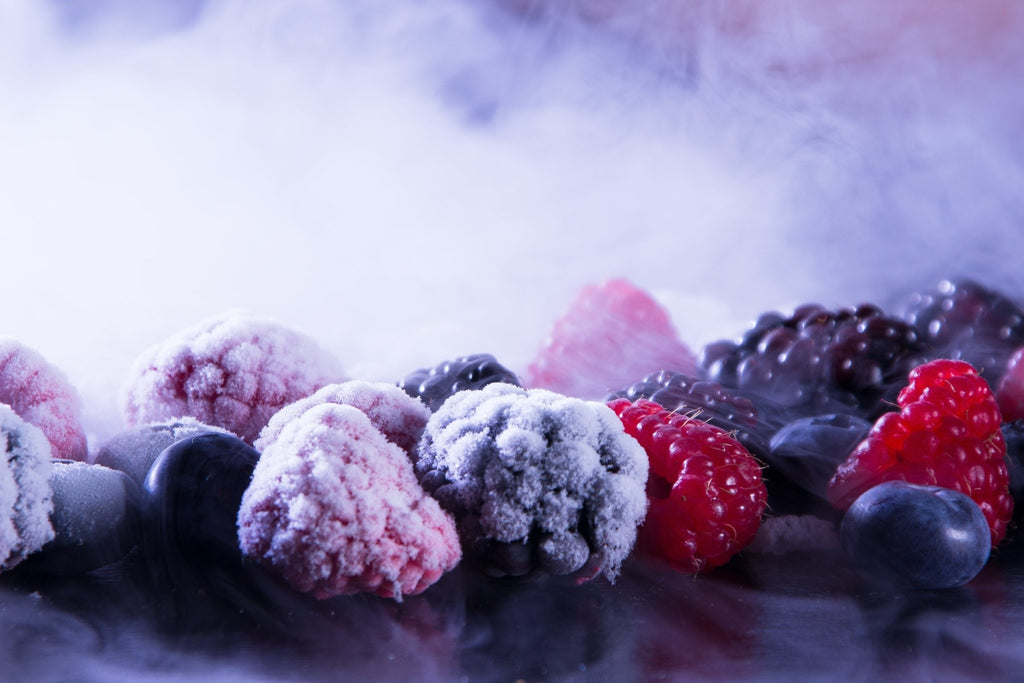Note: PLEASE consult with your doctor before making any changes to your diet or medications. The material on this site is provided for educational purposes only, and is not to be used for medical advice, diagnosis or treatment.
Fresh v. Frozen: The Truth About Which Type of Produce You Should Be Eating

We all know that it’s important to eat fruits and vegetables, but sometimes it can be hard to find the kinds of fresh produce that we enjoy. Or maybe we’re just too busy to make it to the market regularly. What about keeping a stash of produce in your freezer? Having frozen fruits and vegetables on hand can be a great help in making quick and healthy meals. In fact, when it comes to fresh versus frozen fruits and vegetables, the two are in a close race in terms of benefits.
Let’s break down some common questions about fresh and frozen produce and discover how both can play an important role in maintaining a healthy diet.
Why choose frozen produce?
Short answer: It’s easy and convenient!
Long answer: Many things fall under this convenience umbrella, including availability, cost, consistency of quality, and how much work is needed to get something cooked and on the table. You can save a lot of prep time by just defrosting some produce and including it in your meals. And freezing unused produce is a great way to prevent food waste while allowing you to incorporate the types of fruit and veggies you like into your meals any time of year. Try adding frozen spinach or kale to your soup. Or simply defrost a bag of frozen broccoli, add lemon and olive oil for a healthy side dish. And all frozen fruit works great in smoothies.
Is there a nutritional difference between fresh and frozen produce?
Short answer: It depends.
Long answer: What matters is how fresh your fresh produce is and how processed your frozen food is. Fresh foods are sometimes shipped from long distances (up to 1500 miles or more) to supermarket shelves. These fruits and vegetables are picked before optimal ripeness which may result in a slightly lower nutritional value. On the other hand, when you buy locally grown produce at a farmer’s market or produce stand, it’s likely that the food is really fresh; sometimes it’s been picked just a few hours before you buy it. Fresh produce picked at the peak of ripeness is about as nutritionally good as it gets, as long as you eat it within a few days of purchasing.
As far as frozen food, companies use a process called flash-freezing that locks in the nutritional content and preserves the nutrients until you defrost and eat the food. However, there may be some minimal leaching of water-soluble vitamins from the actual freezing process. Most importantly, read the nutrition facts label and ingredient list to be sure there aren’t any other additives like sugar, salt, or other type of preservative.
What about freezing my own produce?
Short answer: Go for it….
Long answer: …but make sure you’re doing it right. The goal is to avoid any risk of foodborne illness, so proper food safety is a priority when you freeze your own fresh produce. Everything should be washed well and dried as much as possible before storing. Then peel, slice and chop the food right before you put it in the freezer. Plastic bags and wrap are fine for things that will be used in the near future, but use freezer bags or heavy aluminum foil if you plan on storing for longer than a month. A more sustainable option is re-usable plastic or glass containers such as mason jars. Try to use frozen items in a timely manner to avoid wasted food. One approach that may help is “first in, first out”: When adding new items to the freezer, place them behind what’s already there. Then when you want to include some frozen food into your meal, just use what’s in the front of the freezer. Labeling with dates can also be helpful (for forgetful people like me!).
Are there things I shouldn’t freeze?
Short answer: Yes, be careful with leafy greens.
Long answer: Some foods lend themselves to freezing better than others. When fruits or veggies are frozen, the water within the individual cells expands and bursts the cell wall. This is problematic for leafy greens like spinach or lettuce because of their high water content and thin structure, so you’ll be left with a watery, limp, unappetizing mess. But frozen greens work just fine if you want to incorporate them into stews or soups. As a general rule, though, other fruits, vegetables, and even fresh herbs tend to freeze well.
Which tastes better?
There’s no right or wrong answer here; let your personal preferences guide your choice. There are times when fresh produce is available and convenient, but for times when it’s not, frozen fruits or veggies are a great alternative.
The bottom line: most of us can’t get in as many fruits and vegetables as we need to without cutting a few corners for the sake of convenience. If reaching for a bag of frozen produce helps you incorporate more fruits or vegetables into your diet when you otherwise might have none, go for it. It’s not really about fresh versus frozen; it’s about making the effort to eat a variety of fruits and vegetables on a daily basis. Smoothie, anyone?
Discover frozen food shortcuts and get delicious freezer-friendly recipes on Fast to the Table Freezer Cookbook.
Want more? You might also like:
What a Nutritionist Eats: A Pro Shares Her Top Go-To Foods
Healthy Comfort Foods? Yes! 9 Recipes Top Bloggers Are Cooking Right Now
10 New Sugar-Free Snack Ideas You Haven’t Thought Of
Celiac Food Diary: The Gluten-Free, Dairy-Free Meals This College Student Relies On
Are You Avoiding Chocolate? 5 Reasons You Shouldn’t Be
























